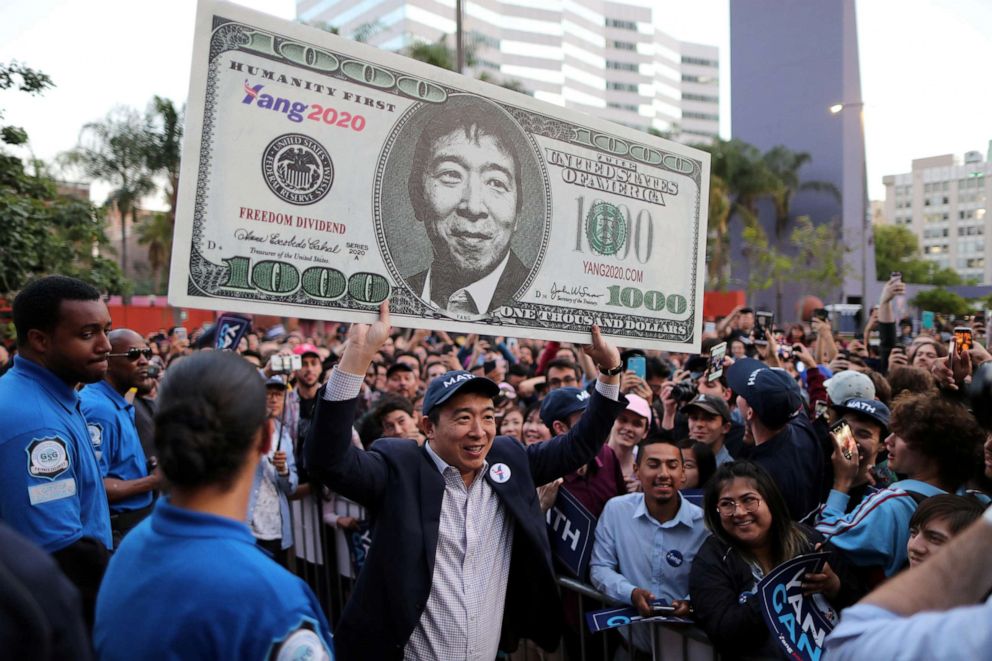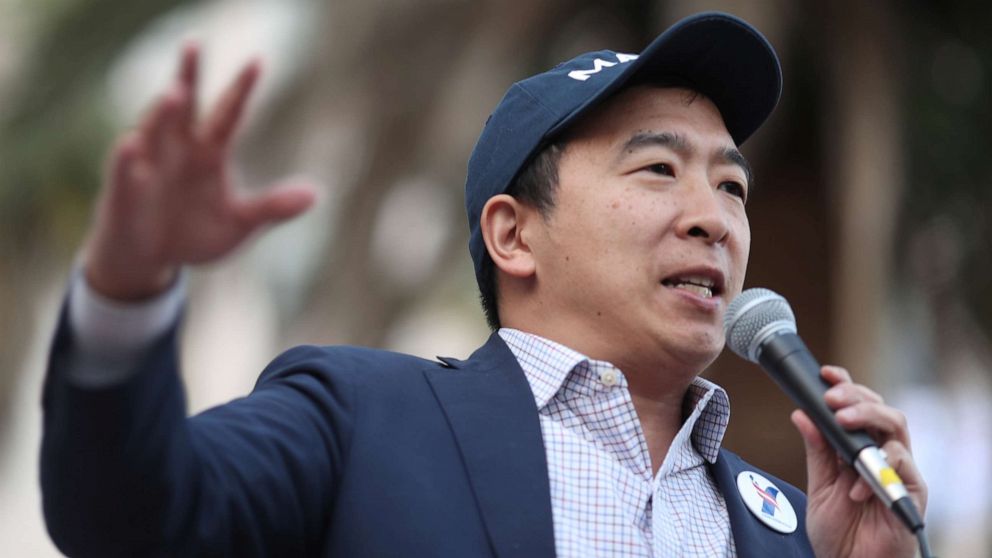Presidential hopeful Andrew Yang targets automation at rain-drenched NYC rally
Andrew Yang, one of the Democratic presidential field's least-known candidates, held one of his campaign's biggest rallies Tuesday at Washington Square Park in New York City, sharing his signature plan to give every American $1,000 per month before a young and diverse crowd that appeared to stretch into the thousands.
Yang, whose "Humanity First Tour" has already attracted large audiences in several major cities across the country, despite his lack of name recognition, identified automation as a major issue threatening the United States' economy, but promised that his proposed "Freedom Dividend" -- the name for his universal basic income payment -- could create new jobs and provide its recipients with the flexibility to live more productively.
"Think about what $1,000 per month would mean in your hands. How would you spend it?" Yang asked the crowd, which was dotted with umbrellas as a steady rain fell over the city. "It would make our children stronger and healthier. It would make us all mentally healthier and less stressed out. It would create more than two million jobs because most of the money would get spent right here in our communities."
The rally Tuesday came as interest in Yang in recent months has steadily risen. The entrepreneur recently qualified for the first Democratic debate in June, after he reached the donor and polling thresholds.
In New York, Yang addressed the forthcoming debate, joking that "millions of Americans are going to turn on the TV that night in June and they're going to ask themselves one question, 'who is the Asian man standing next to Joe Biden?'"
Ahead of the event, Yang's campaign said that "well over" 5,000 people had registered to attend. It also noted that earlier this month, 4,000 people gathered at a Seattle rally and, in recent days, Yang has also held events in battleground states such as New Hampshire and South Carolina.

At each of his campaign stops, the bulk of his remarks are centered around his promise of universal basic income, a plan developed in response to the automation threat -- an issue receiving less attention from other presidential candidates.
"We automated away 4 million manufacturing jobs in Michigan, Ohio, Pennsylvania, Wisconsin, Missouri, Iowa -- all of the swing states that Donald Trump needed to win and did win," Yang said Tuesday. "There's a straight line up between the adoption of industrial robots in a community and the movement towards Donald Trump."
Yang said his plan would be funded, in part, by implementing more taxes on big tech companies like Google, Facebook and Amazon, the latter of which he pointed to as the cause of retail store closures across the country, resulting in widespread job loss in the retail sector.
"Amazon's like a giant vacuum sucking up $20 billion of commerce every year … pushing 30% of malls and stores to close in our country," he said.
However, as some of his Democratic opponents called for breaking up big tech companies, Yang hesitated on what the correct approach would be.
When asked if he would favor breaking up big tech, he said "we should definitely look at curtailing the tech companies influence and part of that would be potentially breaking up some of the companies."
Later, when talking about the negative effects of social media apps on young Americans, Yang had a different response. “It’s not as simple as saying we need to break them up, those are 20th century solutions to 21st century problems," Yang said. "We need a 21st century approach to technology because technologies advanced way past our government’s ability to reckon with that it means for our people."
Some additional proposals featured on Yang's campaign website include his support of lowering the legal voting age to 16, providing free marriage counseling to all and providing every police single officer across the country with a body camera.
The 44-year-old New York native and son of Taiwanese immigrants, launched his campaign for president earlier this year in February. He founded Venture for America, a non-profit aimed at training college graduates to work in startups in cities like Baltimore, Detroit, Pittsburgh and Cleveland. Previously, Yang became CEO of a test-prep start up that was later sold.




